- Home
- Lynne Reid Banks
The Adventures of King Midas (Red Storybook) Page 2
The Adventures of King Midas (Red Storybook) Read online
Page 2
He disappeared into the air, and the roses with him. But after a second, he came back.
“If I were less pleased with my fee, I would not bother to say this,” he said. “But if you should ever want to see me again, come to this spot where my rose once grew and say, ‘Red Rose, bloom again’. But make sure it’s not raining!”
He let out another eldritch chuckle and vanished once more.
Chapter Two
Gold!
The King looked around him.
He wondered if he had been dreaming. He definitely felt dizzy. So he put out his hand and leant against a tree to steady himself.
The rough, warm bark changed instantly under his hand to something hard and smooth and cold. The King took his hand away quickly and looked up at the tree.
At first he couldn’t credit what his eyes told him. From its roots to its topmost branches, the tree was made of shining gold. Every tiny leaf was like a golden mirror that shone so brightly it dazzled the King’s eyes.
He broke off a leaf and stared at it. He broke off some more, until he had a whole handful. On a sudden impulse, he flung them into the air. Sending out sparks of dancing light, they fell heavily, scattering around his feet.
“It’s true,” he breathed, gazing at the tree in a befuddlement that trembled on the brink of absolute happiness. “It’s TRUE!” he shouted, jumping into the air, grasping a low-hanging golden bough in both hands and swinging on it like a schoolboy. “IT’S TRUE IT’S TRUE IT’S TRUE!” he yelled at the top of his lungs, dropping from the branch and capering around the base of the tree.
“I have it! It’s mine! The golden touch is mine!”
He couldn’t stay still. He left the heavy shade of the tree and ran to another, and another. Each one froze to his touch into brilliant, solid, flawless gold. The branches stopped swaying and the leaves stopped whispering. The birds that had been resting in the trees flew away in chirping, frightened clouds. Squirrels fled down the trunks, slipping and sliding. Though they couldn’t be seen, a myriad of insects also made their escape, or tried to, though many were trapped inside and could no longer gnaw their way out.
But King Midas noticed nothing but that his magic touch worked perfectly, and had already made him the most gold-rich person in the world.
At last he had to stop dashing about. He came, puffing, to rest by a rose bush. Not a Midas bush, of course, that was gone for ever, but a beautiful bush all the same. He was so happy he felt he must pick a rose to put in his button hole; but as he broke the flower off, the petals became stiff and shiny, and the King found he was holding a perfect golden rose.
His face broke into a grin. “This takes some getting used to!” he exclaimed. And then he did another silly thing. Without thinking, he bent his head to smell the flower.
Of course it had no scent. That had disappeared as soon as the rose became gold.
The King became very still for a moment. Roses were his great love … But then he pushed away the tiny regret that had come into his mind. He threw away the golden rose and, with his magic hands firmly out of the way, smelt some others to make himself feel all right again.
The next thing he thought of was some cash that was in his pocket – common coins of the realm, made of copper and bronze and nickel. He would change those into gold at once – gold like the pirates in his old storybooks used to have – doubloons! And he reached into the pocket of his jacket.
Instantly a heavy weight fell onto his shoulders so that he was almost pressed to the ground.
“Good heavens! The jacket’s turned into gold now! I keep forgetting!”
He had to break the buttons away to get the jacket off, and as it lay all stiff and cold in the grass, gleaming like a suit of armour, the King almost thought for a moment that it had been nicer before.
He shook himself, feeling the chill breeze without his dear old tweed jacket, his favourite gardening one that he’d had since his wife’s time, and exclaimed aloud, “But how absurd! Now I have all the gold I want, I can buy a new jacket for every day of the year! But of course,” he added thoughtfully, “I shall have to get someone to dress me. H’m. Wonder what old Biffpot’s going to think about all this?”
It was the first time he had considered what anybody else might think, and his thoughts flew to Delia.
“Now she’ll see! Now she’ll understand!” he thought gleefully, and looked around for something to turn into gold as a special present for her.
In the next section of the garden was a fountain with a statue in the middle of it, of a little girl holding a fish. It was made of marble.
“I’ll turn that statue into a golden doll for my little girl,” he thought. As he reached his hand through the spray to touch the statue, all the drops of water turned into gold too, and fell with little splashes into the pool, where they sank to the bottom and lay among the pebbles.
Somehow this thrilled the King. “It works for little things, too!” he thought. “Little, ordinary things!” For pure fun, he touched a stone and saw it glitter among its dull fellows on the path, and then turned a humble garden spade into a magnificent artifact of gold that any museum would give its eye-teeth to own.
“Hooray!” the King cried. “I love this! This is even more fun than the trees! If that old spade were only alive, how proud it would be in the tool-shed among all the other plain ones!” It was a funny thought, and he laughed aloud.
He was just reaching for the golden statue when a small bird alighted on the rim of the fountain for a drink. It was bright yellow and the king recognised it as one of the palace canaries that must have escaped. Delia was very fond of her birds and the King knew that recapturing this one would please her, so he chirruped to the canary, and held out his finger for the little tame thing to hop onto.
It was clearly tired of being free. Trustingly, it hopped.
Hardly had its feet touched Midas’s finger before it fell like a stone into his hand, turned to gold, right to its tipmost wing-feather. It was a very unpleasant feeling, like witnessing sudden death.
The King was dismayed. “Poor little thing!” he cried. “I didn’t mean it! – Oh, please come back to life – what will Delia say?”
But the bird lay stiffly in the King’s hand and stared at him with its sightless golden eyes.
“I really must be a bit more careful,” thought the King. “I can’t just go on doing everything the way I did before. Habit. Everything is habit… Well, I must break some habits, that’s all, it’s a small enough price to pay.”
He tried to lift the golden statue, but soon realised it would be too heavy for Delia. The touch of it on his fingers gave him a sudden shiver, and he let go of it.
He was feeling hungry as well as chilly; the sun was going down and it was time for supper. He thought about the lovely lamb chops and fruit and cake and red wine that he’d ordered for his meal, and after just touching another thing or two to cheer himself up again, he headed for the palace.
“There’s nothing like an afternoon of turning things into gold for giving you an appetite!” he joked to himself, rubbing his magic hands together.
He hurried to the palace dining-room. The first thing he saw as he walked in was a bowl of beautiful fruits on the table. There were apples and pears and peaches and plums, and even a few late figs. Midas licked his lips and imagined his teeth sinking into one of the figs and crunching on the seeds. Or would one of his hot-house peaches be nicer?
Unable to make up his mind, he closed his eyes, picked up a piece of fruit, opened his mouth, and took a big bite.
The next moment the King was shouting and roaring at the top of his voice like an angry lion.
“Ow! Ow!” he bawled, dancing round the dining-room holding his mouth. “I’ve broken my teeth! I’ve cracked my jaw! OW!”
A little serving maid came running into the room.
“Your Majesty, whatever’s the matter?” she cried in alarm.
“I turned an apple into gold and then hurt my fron
t teeth trying to bite it!” roared the King.
“Oh, surely not, Your Majesty!” said the little maid.
“Are you calling me a liar?” shouted the King, red in the face from pain and rage. And he picked up a pear from the dish and threw it at her.
Luckily it missed, but what it did hit was a large mirror hanging behind her, which it smashed into fragments.
The King stopped roaring at once.
“Seven years’ bad luck!” he exclaimed, but the little maid didn’t hear him.
“Don’t hurt me, Your Majesty!” she cried, hiding her face and running out of the room in tears.
The King stood looking at his broken mirror and almost wanted to cry himself.
“I’ve frightened that poor child who only wanted to help me,” he thought remorsefully, “and I’ve broken my lovely mirror that’s been in the family for years. What a silly old man I am.”
But feeling silly didn’t stop him from feeling hungry, so when a manservant came in to see what was the matter, he found the King sitting at the table (in a gold chair, which surprised the manservant who was certain all the chairs in the palace were made of wood) holding in his hands a gold knife and fork.
“Who can have laid the table?” thought the servant. “The gold cutlery is only for state banquets!”
Strangest of all, tucked stiffly into the King’s shirt front was a cloth-of-gold table-napkin.
“Can I be of any assistance, Sire?” asked the servant, bowing low to hide the look of amazement on his face.
“Yes you can,” said the King shortly. “I’m extremely hungry. But I am not able to put any food into my mouth, because everything I touch turns to gold. Even the wine in the goblets! So kindly feed me.”
The servant straightened up.
“You say everything Your Majesty touches turns to gold?”
“You’re not deaf, are you?” said the King testily.
“Are you sure Your Majesty feels quite well?”
The King knew he was going to get angry again in a minute.
“Of course I’m sure, you fool!” he snapped. “Watch this!”
And he picked up a lamb chop from the plate in front of him.
The manservant’s eyes nearly popped out of his head and he made swallowing noises.
“What are you staring at, fellow?” asked the King. “Have you never seen a solid gold lamb chop before?”
“N-no, Sire!” the poor man gasped.
“Well, you have now! Come here at once and feed me! Or will you stand there and watch your monarch dwindle to skin and bone from lack of nourishment?”
But the man didn’t move. At last he finished swallowing and croaked out in a shocked voice: “Forgive me, Sire, but I dare not feed you! You might – you might touch me by mistake, and then I should turn into gold, too!”
“You can’t imagine I’d be such an idiot as to touch a living—” The King’s eyes fell on the little bird that lay beside his plate, and he stopped shouting suddenly. “H’mph. Harrumph. I promise to be careful.” As the man dithered at the far end of the table, the King raised his voice again and shouted: “I said I won’t touch you! See! I’m sitting on my hands! Now come here at once and do as you’re commanded! Do you think I can’t control myself?”
When he still didn’t come, the King’s patience snapped. He snatched one hand out from under him and banged it on the table.
The gold started from where the King was sitting and went shooting down the length of the long table to the end where the servant stood. He gave a yell, jumped back three feet, knocked into the mantelpiece and tipped a vase full of flowers and cold water over his head.
This broke the poor man’s nerve completely.
“Help! Help!” he spluttered, waving his arms. “The King’s bewitched!” And he ran wildly from the room.
The King sat and ground his teeth with frustration. Once again he tackled the remains of his dinner with his gold knife and fork, but the magic passed straight through them to the food.
He bent his head to his plate and tried to eat like an animal. But it was hopeless. He couldn’t get a proper mouthful.
So he pushed away his useless food and sat alone at his golden table. First he sighed, then he groaned, then he sniffed, and at last a great sob came up from inside him and two large tears rolled down his cheeks, splashed onto his hands, and from there bounced onto the floor in drops of gold.
Chapter Three
The Price
The King, in his misery, hadn’t noticed that he was not alone.
In through the french windows, open on the garden, had come a friend of his – a very dear friend, though not a human one. (Kings have some problems with human friends. It’s hard for them to be sure that people like them for themselves, and not just so they can go around saying they’re friends with a king.)
This friend, being a dog, cared absolutely nothing for anyone’s opinion except his master’s. His name was Stray, which explains how the King got him – he’d just wandered into the palace grounds one day when he was a forlorn lost puppy, the head gardener had brought him to the King and the King had given him to Delia. But dogs make their own arrangements as to whom they belong to. Stray belonged to Midas.
Stray sensed, the moment he came in, that all was not well. He thought the King’s bad mood might be due to something he had done, such as burying a certain bone in a certain rose-bed. So he slunk under the table, hoping for better times.
But then he heard strange noises – a sigh, a groan, a sob. Such sounds are very upsetting to a dog. Stray poked his nose out from under the golden cloth. He saw a familiar, and dear, hand hanging limply from the arm of the chair, and, as much as to say, “Cheer up, boss, how’s about a walk, eh?” he nuzzled his nose into the palm of it.
That was the last thing Stray knew.
Even as the King felt the gentle touch of Stray’s tongue against his hand, the warmth went out of it. It became cold and hard. Midas gave a cry of horror, and snatched his hand away. But too late.
Beside his chair stood Stray, not the dog he knew, friendly, full of life, sensitive to the King’s every mood, but a lifeless golden statue.
The King fell to his knees on the floor and embraced this – object. It felt repulsive to his touch. His eyes screwed up to shut out the hateful sight. Shame and regret welled up in his heart and sorrow almost choked him.
“Oh, blind, greed-crazed fool that I am,” he cried. “What have I done?”
But the pictures behind his tight-shut eyes were relentless. The rose, lifeless and scentless; the deathly, empty trees; the little bird with its sightless eyes; and now this – his faithful friend. He imagined them warm and living, and saw them now, cold and dead.
And he got up from his knees and ran to the open windows that led to the garden, to the place where the magician had told him to go to find him again.
But as he reached them, a great flash of lightning lit up the room. There was a roar of thunder, and the rain began pouring down in torrential streams so heavy he could see nothing but water. As it fell on his hands, it bounced onto the sodden ground in shining drops, and suddenly a zigzag of lightning struck hissing and flashing at the metal, like a giant’s pitchfork.
Be sure it’s not raining! The magician’s mocking last words sounded again in Midas’ ears.
Midas made one heroic effort to go out. He was drenched to the skin in two seconds. The lightning struck at his feet again, making him jump back into the dining-room – he couldn’t stop himself. He slammed the windows behind him, locked them, and leant against them, trembling with fright.
There was a strange silence. He raised his eyes. The french windows, glass and all, had turned to gold. The storm, the night, the garden, were closed off from his sight. When he tried tentatively to open them, he found they had fused into a solid gold wall. Of course, there were other ways out, but …
“I shall wait until tomorrow,” he muttered.
He went slowly upstairs to his bedroom
, his head down, dragging his feet, and not even noticing how his magic made the gold shoot along the banisters. He was trying to keep from weeping because Stray was not trotting up after him, and then he thought of something even worse.
Delia!
Of course there was no question of going to her room as he always did, every night, to chat to her and tuck her into bed. Though he had never, ever needed her more … But the danger! No, he mustn’t, anything could happen!
What, then, am I never to see her again –? But he couldn’t face that terrible thought.
“I’ll try to sleep,” he told himself. “Tomorrow the weather will be better. I’ll go to the rose-garden and say –” For one appalling second he thought he’d forgotten the magic words, but then they came back to him: “‘Red rose, bloom again’. He’ll come, that fiend – no, no, not fair, mustn’t blame him, he gave me a chance to think and I didn’t, I didn’t! Oh, was there ever a man so stupid! – Anyway, he’ll return, and heaven alone knows what he’ll want as a fee this time, but whatever it is he shall have it, even if it’s half my kingdom or ten years of my life, just so I can be rid of this ghastly curse I’ve brought down on my idiotic old head!”
Biffpot was waiting in the King’s dressing-room. The servants’ quarters were alive with the most terrible rumours. Several of the staff had packed up and left. But Biffpot was devoted to the King, and determined that he would be the last to desert his employer, who had always been very good to him.
“Are you retiring early, Sire?” he asked, trying to keep his voice quite normal.
“Yes, Biffpot,” said the King, and then, as the man made a step towards him, he suddenly shouted:
“Keep back, man, don’t come near me!”
Biffpot started back. The King was very agitated and kept his hands behind him. They stared at each other.
“Will you – disrobe yourself, Sire?” asked Biffpot at last.
The King was breathing heavily, and frowning.
“No. I must have help with – my clothes,” he said at last in a strangled voice. “There must be – some answer – to my immediate problems. Ah … Biffpot, the gauntlets!”

 Two Is Lonely
Two Is Lonely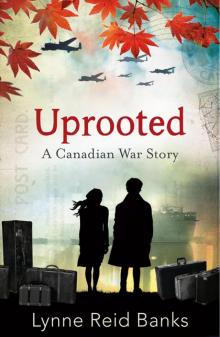 Uprooted - a Canadian War Story
Uprooted - a Canadian War Story The Backward Shadow
The Backward Shadow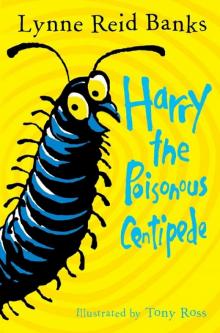 Harry the Poisonous Centipede: A Story to Make You Squirm
Harry the Poisonous Centipede: A Story to Make You Squirm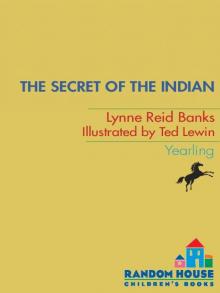 The Secret of the Indian (The Indian in the Cupboard)
The Secret of the Indian (The Indian in the Cupboard)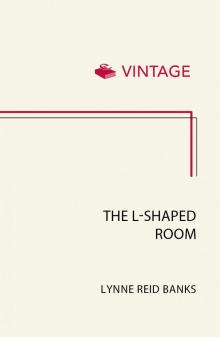 The L-Shaped Room
The L-Shaped Room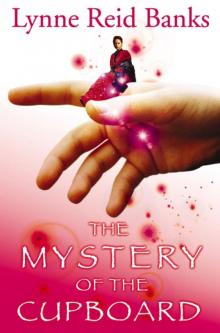 The Mystery of the Cupboard
The Mystery of the Cupboard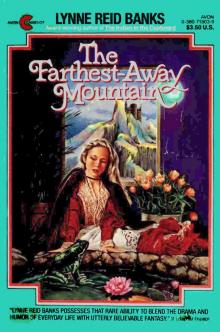 The Farthest-Away Mountain
The Farthest-Away Mountain Harry the Poisonous Centipede Goes to Sea
Harry the Poisonous Centipede Goes to Sea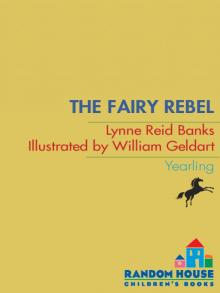 The Fairy Rebel
The Fairy Rebel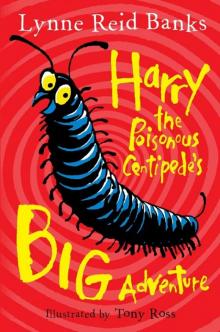 Harry the Poisonous Centipede's Big Adventure: Another Story to Make You Squirm
Harry the Poisonous Centipede's Big Adventure: Another Story to Make You Squirm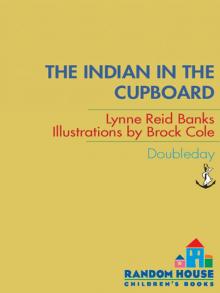 The Indian in the Cupboard
The Indian in the Cupboard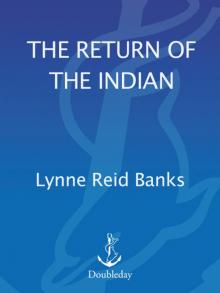 The Return of the Indian
The Return of the Indian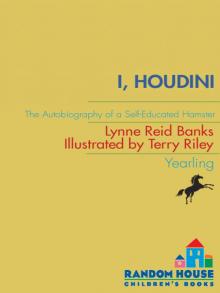 I, Houdini
I, Houdini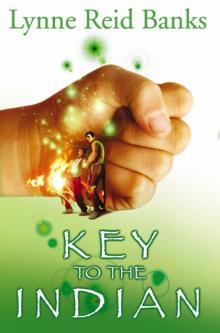 The Key to the Indian
The Key to the Indian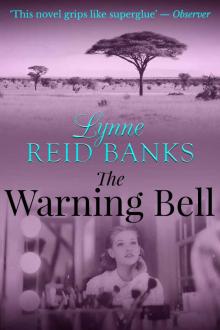 The Warning Bell
The Warning Bell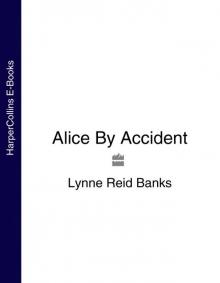 Alice by Accident
Alice by Accident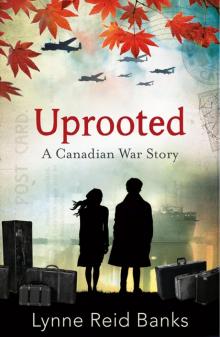 Uprooted
Uprooted Writing On the Wall
Writing On the Wall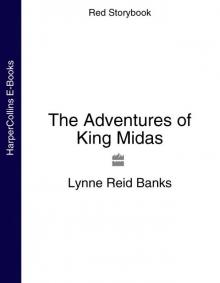 The Adventures of King Midas (Red Storybook)
The Adventures of King Midas (Red Storybook)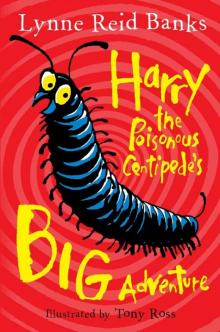 Harry the Poisonous Centipede's Big Adventure
Harry the Poisonous Centipede's Big Adventure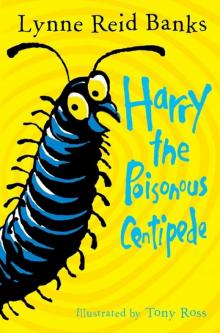 Harry the Poisonous Centipede
Harry the Poisonous Centipede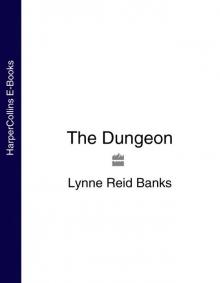 The Dungeon
The Dungeon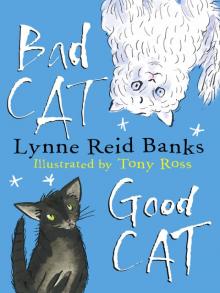 Bad Cat, Good Cat
Bad Cat, Good Cat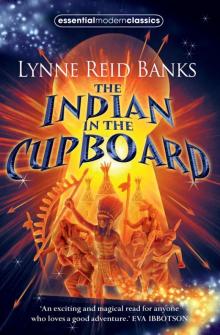 The Indian in the Cupboard (Essential Modern Classics, Book 1)
The Indian in the Cupboard (Essential Modern Classics, Book 1)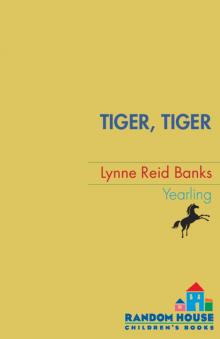 Tiger, Tiger
Tiger, Tiger